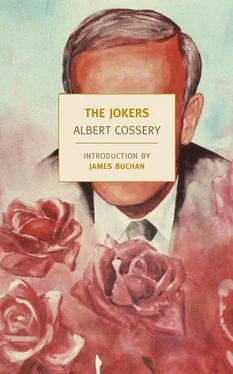“I’m sorry, Karim, my brother, but sometimes I just forget to laugh. It’s a weakness, I know, but I can’t help it.”
Though he wasn’t going to let himself think about it, Karim was fully aware of the troubles that weighed on the schoolmaster’s sensitive soul. To have a mother who’d gone crazy was hardly cause for celebration. Karim understood this so well, in fact, that he’d do anything to avoid the woman; she terrified him. When he came to see Urfy, he went out of his way not to cross her path. Now suddenly he felt she was there, spying on them, and he flinched as if at the approach of danger. Despite himself, he turned toward the door. He didn’t see anyone at first; then the crazy old lady materialized before his eyes. There she was, towering in the doorframe like a specter — an old lady reduced almost to a skeleton but with a mysterious, bewitching power. She looked haggard and disheveled. She’d stopped eating a long time ago and now only nibbled at bread crumbs while staunchly refusing anything of substance. Eyeing the empty classroom with its deserted seats, she deliberately ignored her son and the stranger who was with him. At first Karim was petrified; he thought he was seeing a ghost. But then, robotically, he rose and bowed deeply to the emaciated form in the doorway.
Urfy had remained calm. He gestured to Karim to keep still and looked up at the strange apparition, his myopic eyes moist with emotion.
Full of confidence, propelled by an ancient reflex of maternal authority, the old woman strode toward them. Karim thought of running, but it was too late. He no longer felt like laughing, that was sure.
“Where are the children?” asked the woman. “He’s the only one left,” she added, looking at Karim with suspicion.
“Mother,” said Urfy. “You don’t recognize my friend Karim?”
“Of course I recognize him. He’s a good student, he’ll succeed in life. Since the others have left, he’ll recite his lesson for me.”
She walked briskly to the platform and sat down at Urfy’s desk, resolute. With a bony hand she picked up the ruler, pointing it at Karim:
“Well then, young man! Recite your lesson!”
Karim was in hell. He glared at Urfy with the desperate look of a drowning man who loves life and dreads dying. But Urfy paid no attention to his distress — he had assumed an impenetrable mask and was following the scene with the cold assurance of a psychiatrist observing a hypothesis play out. The schoolmaster’s attitude troubled Karim. Was this some kind of revenge, leaving him at the mercy of a madwoman? Was Urfy expecting him to explode into laughter, as he usually did no matter the situation? Yes, it was a dare: that and nothing else.
Finally, at the end of what seemed to be an eternity, Urfy spoke in a matter-of-fact tone without any urgency:
“Mother, it’s time for you to go to bed.”
The old lady didn’t seem to hear; she was sticking to her idea.
“Come on, child! You’re holding us up!”
Karim realized that to escape from this trap, he’d have to play along with her game. Remembering a vaguely patriotic text that he’d learned in his childhood, he started to recite it in a hoarse voice, clearing his throat several times in the process.
The madwoman watched him with her demented eyes; she seemed to be enjoying his recitation. Despite her witchlike demeanor, she still projected the prim dignity of a schoolmistress on a mission.
“That’s very good,” she said when Karim had finished. “I congratulate you! You’ve made progress since the last time. I’ll tell your father that you are deserving of the money he spends on you.”
Karim bowed deeply from the waist several times, as if the congratulations of the old lady were too heavy for his humility to bear. Deep down, he felt intensely proud of his triumph over the circumstance. He grinned victoriously at Urfy, showing that he’d taken note of his challenge and had risen to it handsomely.
Just then, Urfy was seized by panic. All of a sudden he couldn’t see — he thought he’d been struck blind. It took him a moment to understand the reason for this sudden loss of sight: the tears he’d been struggling to repress now filled his eyes, and the lenses of his glasses were all fogged up. He removed them quickly and wiped them off with his handkerchief, his fingers shaking with panic. When he put them back on, he saw that the two protagonists of his nightmare were still in place, immobile, dumbstruck as if waiting for him — and him alone — to break off the session. He hurried to the podium, put his arm around his mother’s shoulders, and all but carried her to the door. The madwoman let him do as he pleased, oblivious now to everything; she didn’t even give a passing glance at Karim. He bowed one last time and didn’t straighten up until they had left the room.
He wasn’t alone for long. Urfy returned right away, deeply troubled.
“Please excuse me,” he said, in a quiet voice. “I’m terribly, terribly sorry!”
Now that the danger was past, Karim was as jovial as ever.
“No harm done,” he remarked cheerfully. He was going to add “It was a real pleasure,” but restrained himself in time.
“It’s my fault,” Urfy went on. “I should confine her to her room, but I don’t have the heart to do it.”
“Don’t feel bad,” said Karim. “You know, for me it was a magnificent surprise! I never could recite that lesson when I was a kid, and look how it came back all of a sudden! It’s amazing, don’t you think?”
Urfy didn’t feel like responding; all he said was:
“Shall we go?”
Emerging from the basement into the blazing street, they felt a blast of intense heat and immediately began to sweat. Karim took off his jacket and draped it over his arm; then he unbuttoned his collar and rolled up his sleeves, taking on a sporty look. Urfy didn’t follow his friend’s sartorial lead; too many of his students’ parents were around for him to indulge in such informality. Keeping their distance from each other — the slightest touch would be unbearable in this atmosphere — they walked toward the port. On the way they passed an infinity of empty side streets where, inside the rare open shops, you could see the owners taking their siestas in their chairs, handkerchiefs draped across their faces to ward off flies. They looked so much like corpses that Karim had to look away with a shudder. Farther on, half-naked children played in the puddles left by the municipal sprinklers; they splashed around happily and peppered Karim with insults as unoriginal as the minds of their mothers. The young man sighed: this generation had no talent for invective, a weakness he attributed to the new regime. But the heat distracted him from this distressing thought. In a hurry to escape from the furnace he picked up his pace, dragging Urfy in his wake.
Twenty minutes into this feverish walk they started to feel a slight breeze, a sign they were nearing the sea. Between buildings they glimpsed long ocean liners, anchored and at rest. Karim stopped in front of a run-down yellow building, took a key from his pocket, and opened the padlock on the immense double-hung gate.
“Come in,” he said to Urfy.
The warehouse Khaled Omar had loaned them contained immense amounts of all kinds of merchandise; countless crates and sacks were stacked against the walls and rose from the dirt floor to the ceiling. They’d had to clear the middle of the space to set up the manual press, whose metal frame gleamed faintly in the dim light. The cleared area was not very big, and Urfy got the impression that the crates might all come tumbling down onto his head. He picked his way carefully, eyes focused on the one small, grilled window that let in a stingy stream of light. After the blinding glare of the street, this was all he had to guide himself by in the darkness. When he reached the window, he saw that someone had set up a table and two chairs. On the table were trays full of lead type. Taking a seat, he mopped his forehead with his handkerchief and gazed with wonder at the great metal machine enthroned there like a fantastic beast in a jungle of merchandise.
Читать дальше












